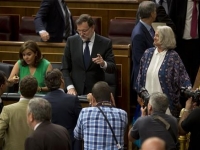Politics
Rajoy doubt between 13 and 20 December for legislative
Confirmed before the end of year
USPA NEWS -
Finally, the legislative elections in Spain will be in December. The Prime Minister, Mariano Rajoy (Conservative), said Wednesday he doubts between Sunday 13 and Sunday 20 December, after aprobation of State budget for 2016 in the Parliament.
These two dates are, according to Rajoy, the most suitable due to the time that marks the parliamentary process of the State budget for 2016. The State Accounts shall be definitively approved in the Lower House of the Spanish Parliament the week of 19 to 23 October and the Spanish electoral law stipulates that elections must be held 54 days after its announcement. Since the call, which leads to the dissolution of Parliament, may not be made before 23 October, the elections must be held between 13 and 20 December.
Rajoy had repeatedly stated that not unnecessarily delay the end of the legislature. Once approved the State budget, the intention of Rajoy is that starts managing the Government that emerges from the elections and this requires that elections be held before the end of the year. Thus, a question that has flown over the Spanish policy in recent months is cleared.
The December elections will be held at a crucial time of Spanish politics. On September 27 regional elections in Catalonia, the leaders of this region interpreted as a plebiscite. If they get a sufficient majority, they would declare unilateral independence of Catalonia and that pose a significant problem to the Government of the nation, which has reiterated his decision not to allow the Catalan leaders violate the Constitution. This supreme law establishes the indissoluble unity of Spain and empowers the Government to suspend the powers of a region in flagrant crime.
In addition, legislative elections will help determine the health of bipartisanship in Spain. In May, in local and regional elections held then, the two main political parties, the conservative PP and the PSOE Socialist Party, received a strong punishment of the emerging parties that won representation in local councils and regional parliaments took advantage. However, recent surveys point to a recovery of bipartisanship and a significant loss of support for populist parties, which has not benefited the failure of Syriza in Greece.
Podemos, the Spanish populist party that publicly supported Syriza and presented himself as a champion of the fight against the old politics, corruption and the economy which is suffocating the masses, lose 35% of votes if elections were held now, according to a recent survey. But the Spanish political landscape is still far from clear. Next months come so interesting.
Liability for this article lies with the author, who also holds the copyright. Editorial content from USPA may be quoted on other websites as long as the quote comprises no more than 5% of the entire text, is marked as such and the source is named (via hyperlink).






